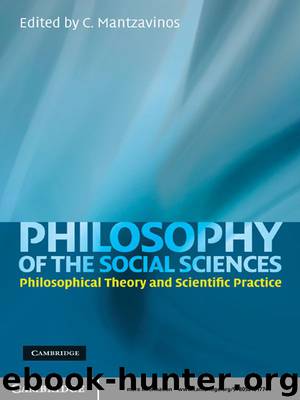Philosophy of the Social Sciences: Philosophical Theory and Scientific Practice by Unknown

Author:Unknown
Language: eng
Format: epub
ISBN: 9780511757891
Publisher: Cambridge University Press
Published: 2009-09-09T22:00:00+00:00
5 Conclusions
I believe that the social sciences need to be framed out of consideration of a better understanding of the nature of the social – a better social ontology. The social world is not a system of law-governed processes; it is instead a mix of different sorts of institutions, forms of human behavior, natural and environmental constraints, and contingent events. The entities that make up the social world at a given time and place have no particular ontological stability; they do not fall into “natural kinds”; and there is no reason to expect deep similarity across a number of ostensibly similar institutions – states, for example, or labor unions. So the rule for the social world is heterogeneity, contingency, and plasticity. And the metaphysics associated with our thinking about the natural world – laws of nature; common, unchanging structures; and predictable processes of change – do not provide appropriate metaphors for our understandings and expectations of the social world; nor do they suggest the right kinds of social science theories and constructs.
Instead of naturalism, I advocate an approach to social science theorizing that could be described as post-positivist. It recognizes that there is a degree of pattern in social life – but emphasizes that these patterns fall far short of the regularities associated with laws of nature. It emphasizes contingency of social processes and outcomes. It insists upon the importance and legitimacy of the eclectic use of social theory: the processes are heterogeneous, so it is appropriate to appeal to different types of social theories as we explain social processes. It emphasizes the importance of path-dependence in social outcomes. It suggests that the most valid scientific statements in the social sciences have to do with the discovery of concrete social-causal mechanisms, through which some types of social outcomes come about. And finally, it highlights what I call “methodological localism”: the insight that the foundation of social action and outcome is the local, socially located and socially constructed individual person. The individual is socially constructed, in that her modes of behavior, thought, and reasoning are created through a specific set of prior social interactions. And her actions are socially situated, in the sense that they are responsive to the institutional setting in which she chooses to act. Purposive individuals, embodied with powers and constraints, pursue their goals in specific institutional settings; and regularities of social outcome often result.
My most central conclusion, however, is ontological. We ought not think of the social world as a system of phenomena in which we can expect to find a strong underlying order. Instead, social phenomena are highly diverse, subject to many different and cross-cutting forms of causation. So the result is that the very strongest regularities that will be ever be discerned will remain the exception-laden phenomenal regularities described here and the highly qualified predictions of regularities that derive from structure–agent analyses. There is no more fundamental description of the social world in which strong governing regularities drive events and processes.
It is highly relevant that
Download
This site does not store any files on its server. We only index and link to content provided by other sites. Please contact the content providers to delete copyright contents if any and email us, we'll remove relevant links or contents immediately.
| Administration & Medicine Economics | Allied Health Professions |
| Basic Sciences | Dentistry |
| History | Medical Informatics |
| Medicine | Nursing |
| Pharmacology | Psychology |
| Research | Veterinary Medicine |
Good by S. Walden(3526)
The Social Psychology of Inequality by Unknown(2994)
The Checklist Manifesto by Atul Gawande(2825)
0041152001443424520 .pdf by Unknown(2821)
The Meaning of the Library by unknow(2540)
Get What's Yours for Medicare: Maximize Your Coverage, Minimize Your Costs by Philip Moeller(2422)
Guns, Germs and Steel by Diamond Jared(2341)
Borders by unknow(2286)
23:27 by H. L. Roberts(2230)
And the Band Played On by Randy Shilts(2174)
Being Mortal: Medicine and What Matters in the End by Atul Gawande(2095)
A Leg to Stand On by Oliver Sacks(2024)
The Hot Zone by Richard Preston(2002)
More Than Words (Sweet Lady Kisses) by Helen West(1841)
The Valachi Papers by Peter Maas(1834)
The Laws of Medicine by Siddhartha Mukherjee(1779)
The Andromeda Strain by Michael Crichton(1723)
The Obesity Epidemic by Robyn Toomath(1656)
Get What's Yours for Medicare by Philip Moeller(1572)
